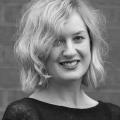
Set in New South Wales in the early 1800s, The Secret River follows William Thornhill, an English convict who was banished to Australia for theft. On being made a free man, Thornhill decides he and his family should stay in Australia where they can claim, own and farm a patch of land along the Hawkesbury River, rather than return to the poverty they left behind in London. But the land is not Thornhill’s to take; it’s the home of the Dharug people, Aboriginals who were living there long before the settlers came.

Through scenes that are at times touching and full of hope, at others harrowing and full of the violence we now know to be the story of Australia's earliest settlers, we see the two families – the Thornhills and a Dharug clan – meet, attempt to communicate, but ultimately fail to see eye-to-eye with one another.
All this is overseen and narrated to us by Dhirrumbin, an Aboriginal woman who in Australia and Edinburgh was played by performance artist Ningali Lawford-Wolf, who also helped develop the play. But following the sudden death of Lawford-Wolf in Edinburgh, the part is in the hands of Pauline Whyman, who joins the cast from Melbourne and on press night was reading off the book. Whyman undoubtedly has some way to go with making the role her own, but having her read the part does not deduct from it – as the story’s narrator, it works.

Led by Nathaniel Dean in the role of William Thornhill and Georgia Adamson in the role of his wife Sal, the stirling cast do a zealous and heart-felt job of telling the story, and were it not for a brief introduction by director Neil Armfield, you would not know this was a cast grieving the loss of an integral member.
The action plays out on a sparse stage designed by Stephen Curtis. Eucalyptus branches frame the space on both sides and above, while cascading sheets become giant rock formations behind the action. These, under Mark Howett’s stunning lighting, shift from fiery red to elephant gray or pale sand as the light changes throughout the day.
The Olivier does, however, feel too big a space for this story. Having the characters dwarfed by the rocks behind them works, but a more intimate setting would help bring us closer to the tale.

Another slightly jarring decision is to not translate the speech of the Dharug people. It comes from good intentions: as a white writer, Grenville felt putting words into the mouths of Aboriginal people was a line she could not cross. On turning it into a play, Bovell knew he couldn’t have voiceless black characters on stage, so he had the portion of the cast playing Aboriginal people taught to speak Dharug. He left their words untranslated in a bid to represent the troubles the two groups had communicating.
This has the slightly negative effect of making it predominantly a 'white' story. At the same time, the misunderstandings form much of the play’s joy: the gift exchange between Dulla Djin (Ema Kris) and Sal is particularly magical, as is the heartwarming scene of the children finding the common language of play, turning the stage into a makeshift water slide.

Music is integral to both parties too and while it doesn’t unite them, Iain Grandage’s score, with English pub songs layered over with Aboriginal chants, shows us just how rooted the act of singing together is in both cultures.
The Secret River is not a story with a happy ending but it’s an important one to tell on the London stage. After all, many of the original settlers with their ideas of land ownership were British. What Grenville’s novel – and subsequently Bovell’s stage adaptation – do brilliantly is raise awareness of the facts, bringing 200-year-old history to our attention on stage.
| What | The Secret River, National Theatre review |
| Where | National Theatre, South Bank, London, SE1 9PX | MAP |
| Nearest tube | Waterloo (underground) |
| When |
23 Aug 19 – 07 Sep 19, Performances at 1PM and 7PM. Running time: 2h 50min |
| Price | £18-£88 |
| Website | Click here for tickets and information |






